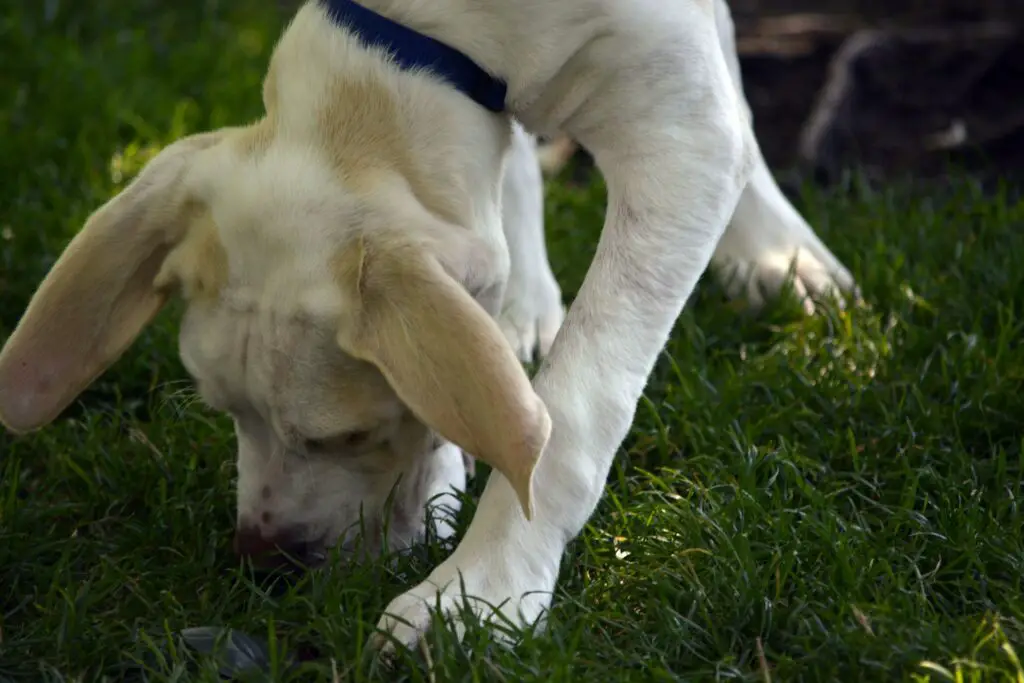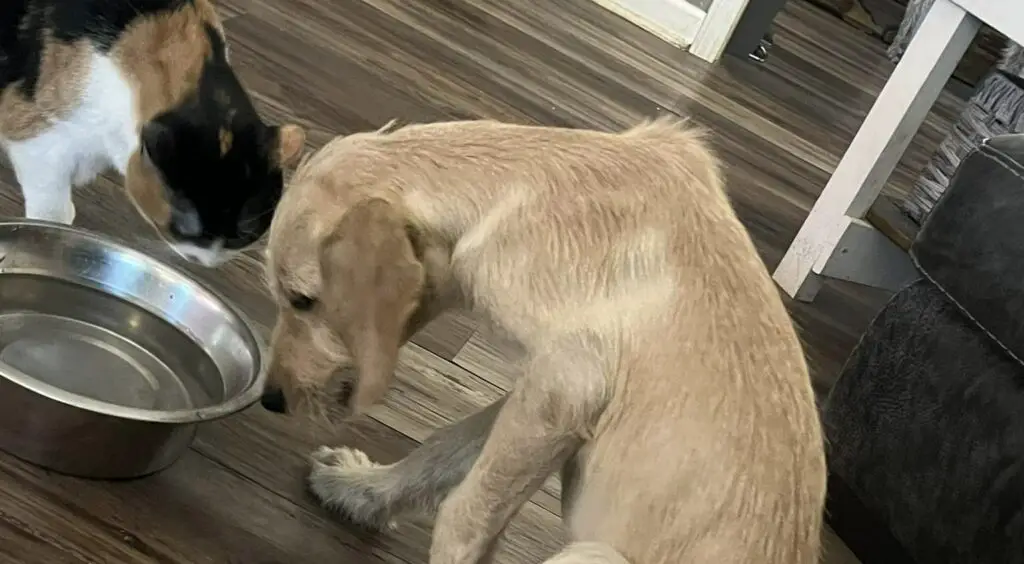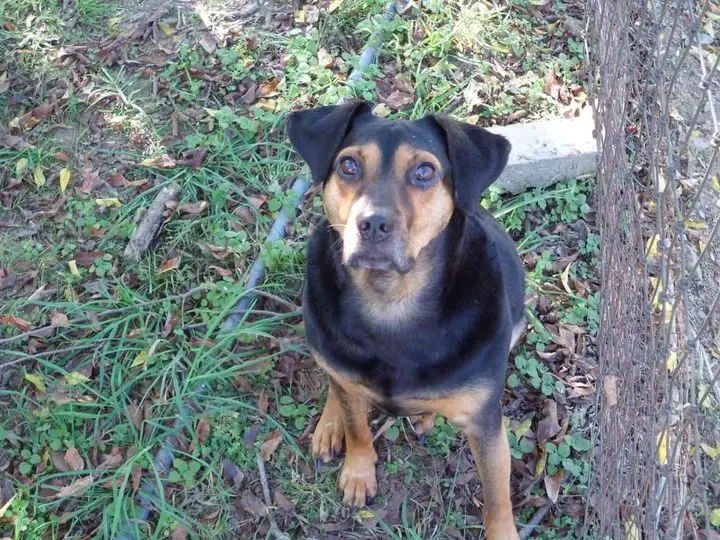Dogs do some weird stuff that we will probably never fully understand.
One of those is they rub their nose on the floor before eating.
At first, this might seem weird, but it has to do with their ancestral DNA.
Read on to find out why your dog rubs its nose on the floor before eating.
- Why Does My Dog Rub Its Nose On The Floor Before Eating?
- What To Do About My Dog Rubbing Its Nose On The Floor Before Eating?
- Why Does My Dog Wipe Its Nose Before Eating?
- Why Does My Dog Rub Its Nose On The Floor After Eating?
- Why Does My Dog Play With Its Food Before It Eats It?
- Why Does My Dog Roll In Its Food Before Eating?
- Why Is My Dog Nudging Their Food Around?
- Why Do Dogs Lick Their Nose When Hungry?
- In Conclusion
When a dog rubs their nose on the floor before eating, it is an instinctual behavior called “nose-marking” which helps them claim an area as theirs and leave their scent behind.
My Dog Rub Its Nose On The Floor Before Eating

Your dog rubbing its nose on the floor before eating is an instinctual behavior known as “nose-marking” or caching, which serves to claim an area, hide their food, or satisfy a tingling sensation in their noses due to olfactory stimulation.
Dogs in the wild had to compete for resources, so they developed various strategies to ensure their survival. One of these tactics was to hide or bury their food to keep it safe from other animals.
By rubbing their noses on the ground, they were effectively marking their territory and signaling that this food was theirs.
Even though domesticated dogs have their meals provided for them and don’t need to worry about other animals stealing their food, many still retain these instinctual behaviors.
Your dog rubbing its nose on the floor before eating is likely an expression of this. It’s a way for them to spread their scent around, marking their territory and their food.
This behavior can also be triggered by stimulation in the nasal cavity. Just like we might rub our noses when we feel a tickle, dogs may do the same.
The act of eating, with its associated smells and anticipatory excitement, can cause a tingling sensation in their noses leading to this rubbing behavior says Insider.
What To Do About My Dog Rubbing Its Nose On The Floor Before Eating?

Here’s the information presented in a table format:
| Behavior | Explanation |
|---|---|
| Scent-Marking | One of the primary reasons dogs exhibit this behavior is to mark their territory. By rubbing their noses on the floor, they deposit their unique scent, thereby claiming their food and eating area as their own. This behavior is rooted in their ancestral instincts where marking territory was crucial for survival. |
| Food Caching | Another possible explanation for your dog’s behavior is the instinct to cache or bury food. In the wild, dogs would often hide excess food for later consumption, protecting it from other predators. Your domesticated pooch may be exhibiting a diluted version of this behavior, especially if it doesn’t finish its food in one go. |
| Olfactory Stimulation | Dogs have an exceptional sense of smell, and meals are an exciting time for them. The act of rubbing their nose on the floor could also be due to olfactory stimulation. The anticipation of food might cause a tingling sensation in their noses, which they relieve by rubbing against the floor. |
Your dog rubbing its nose on the floor before eating is a common, instinctual behavior that can be attributed to a variety of reasons such as scent-marking, mimicking food caching, or responding to olfactory stimulation.
Scent-Marking
One of the primary reasons dogs exhibit this behavior is to mark their territory. By rubbing their noses on the floor, they deposit their unique scent, thereby claiming their food and eating area as their own. This behavior is rooted in their ancestral instincts where marking territory was crucial for survival.
Food Caching
Another possible explanation for your dog’s behavior is the instinct to cache or bury food. In the wild, dogs would often hide excess food for later consumption, protecting it from other predators. Your domesticated pooch may be exhibiting a diluted version of this behavior, especially if it doesn’t finish its food in one go says A-Z Animals.
Olfactory Stimulation
Dogs have an exceptional sense of smell, and meals are an exciting time for them. The act of rubbing their nose on the floor could also be due to olfactory stimulation. The anticipation of food might cause a tingling sensation in their noses, which they relieve by rubbing against the floor.
As a veterinarian, I’ve seen many dogs exhibit this type of behavior. It’s generally harmless and nothing to be concerned about.
However, if your dog seems distressed while doing it or if it’s accompanied by other unusual behaviors, I’d recommend consulting with a vet to rule out any potential health issues.
Remember, every dog is unique and behaviors can vary based on their personality, breed, and environment. It’s always best to observe and understand your pet’s behavior in the context of their overall well-being says Rover.
Why Does My Dog Wipe Its Nose Before Eating?

Dogs are wiping their noses before eating as a way of cleaning themselves and eliminating strong odors or tastes from their mouth.
This could enhance the flavor of food for them, making it more enjoyable to eat.
Furthermore, this behavior could have evolved naturally from their ancestors who used to scavenge for food in the wild, having to protect themselves from potential predators or other sources of danger.
No matter why this behavior occurs among dogs, it’s quite common and shouldn’t cause alarm if your pup does this before meals says PetCube.
Why Does My Dog Rub Its Nose On The Floor After Eating?
Your dog may be using its nose to mark its territory after eating. Dogs possess scent glands in their noses, which they use to leave behind some of their unique odors and claim the space as theirs.
When your pup rubs its nose on the floor, it leaves behind some of these same unique aromas and marks that space as its own territory.
Also, it is very common for dogs to rub their nose on the floor after eating because they are trying to find a place to bury the remains of the food.
In the past, dogs didn’t have three meals a day so they had to save whatever is left from the food for later.
They often did this by burying foods and coming back later to snack on them says Reader’s Digest.
Why Does My Dog Play With Its Food Before It Eats It?
Dogs often engage in play with their food before they eat it, which may indicate that the pup finds the meal enjoyable and finds it interesting.
Some experts believe this behavior to be instinctive, as wild canines often use paws or noses to manipulate potential prey into an optimal spot for eating.
It could also serve as a reminder of how much fun hunting was for ancestral dogs; playing with food allows them to relive those feelings from earlier times.
Furthermore, your pup may just enjoy mixing things up – similar to how humans enjoy stirring cereal or mixing up ingredients before consumption!
Why Does My Dog Roll In Its Food Before Eating?
One possible explanation for why your dog may be rolling in its food before eating is that it may be marking territory.
Dogs possess scent glands in their mouth and paws, so when they roll around in their food, they leave behind their unique scent to claim it as theirs.
This behavior could also stem from pack behavior: by rolling around in food, dogs may be trying to assert ownership over it and ensure no other animals or people take away what belongs to them.
Alternatively, some dogs simply enjoy rolling around in something soft like kibble or wet food; by doing this they may be stimulating themselves mentally and preparing themselves for what comes next at mealtime.
Why Is My Dog Nudging Their Food Around?
Your dog nudging their food around is often an instinctual behavior that can be related to their natural tendency for food caching, territorial marking, or a simple preference for movement during eating.
Dogs nudging their food around can be a demonstration of their primitive instincts. In the wild, canines would often bury their food, or cache, to save it for later and protect it from other predators. Your dog, even in a domestic setting, might be exhibiting a toned-down version of this behavior.
Another possible explanation is territorial marking. Dogs have a strong sense of smell and by nudging their food around, they could be marking their territory. This is a way for them to communicate that the food and the area around it belong to them.
Some dogs might also nudge their food around due to a simple preference for movement during eating. Some dogs enjoy playing with their food, and nudging it around could make mealtime more enjoyable for them.
From my experience as a vet, it’s important to note that these behaviors are generally harmless and are part of a dog’s unique character.
However, if the behavior is causing distress or if your dog is not eating properly, it might be best to consult a professional to rule out any potential health issues says Vetstreet.
Why Do Dogs Lick Their Nose When Hungry?
Dogs often lick their noses when they are hungry as it helps intensify their sense of smell and could be a reaction to the aromas of food.
When dogs are hungry, they may lick their noses more frequently due to the increase in salivation and anticipation of food.
The act of licking their nose helps to keep it moist, which in turn enhances their ability to absorb scent particles and intensify their sense of smell. This increased sensitivity to smell aids them in locating and identifying their food.
Additionally, licking their nose can also be a dog’s response to the strong aroma of food. Dogs have an exceptional sense of smell, and the presence of food can elicit a natural reaction to lick their nose and prepare for eating.
From my veterinary experience, I’ve observed this behavior in many dogs around meal times. It’s a normal part of their feeding habits and doesn’t usually indicate any health issues.
However, if your dog is constantly licking its nose, not just when it’s hungry, it might be worth having them checked by a vet, as excessive nose licking could signal discomfort or a medical issue like allergies or infections.
FAQs
Q: Is it normal for dogs to rub their noses on the floor?
A: Yes, it is a normal behavior for dogs to rub their noses on the floor. It is a natural instinct for them to mark their territory or to spread their scent. However, if you notice excessive rubbing or any signs of discomfort, it is best to consult with a veterinarian to rule out any underlying health issues.
Q: How can I prevent my dog from rubbing its nose on the floor?
A: While it may not be possible to completely prevent your dog from rubbing its nose on the floor, you can try redirecting their behavior by offering them a suitable alternative, such as a chew toy or a treat. Providing enough mental and physical stimulation for your dog can also help reduce the frequency of this behavior.
Q: Are there any health concerns associated with dogs rubbing their noses on the floor?
A: In most cases, rubbing their noses on the floor is harmless. However, if you notice any signs of irritation, redness, or swelling, it could be a sign of an underlying issue such as allergies, skin infections, or nasal congestion. If you are concerned about your dog’s health, it is best to consult with a veterinarian.
Q: Should I be worried if my dog rubs its nose on the floor excessively?
A: Excessive rubbing of the nose on the floor could indicate an underlying issue or discomfort. If you notice that your dog is rubbing its nose on the floor excessively and it is accompanied by other unusual behaviors or symptoms, such as sneezing, coughing, or nasal discharge, it is important to have your dog checked by a veterinarian.
Q: Can dogs rub their noses on the floor as a sign of stress or anxiety?
A: Yes, dogs can exhibit various behaviors when they are stressed or anxious, and rubbing their noses on the floor can be one of them. If you suspect that stress or anxiety is causing your dog to engage in this behavior, it is recommended to consult with a professional dog trainer or a veterinarian who specializes in behavior to determine the underlying cause and develop a suitable treatment plan.
Q: Are there any specific breeds that are more prone to rubbing their noses on the floor?
A: There are no specific breeds that are more prone to rubbing their noses on the floor. This behavior can be exhibited by dogs of any breed or mix. It is important to remember that each dog is an individual and may have their own unique behaviors and tendencies.
Q: Can I train my dog to stop rubbing its nose on the floor?
A: It may be challenging to completely stop a dog from rubbing its nose on the floor, as it is a natural instinct. However, you can try to redirect their behavior by providing suitable alternatives and engaging them in other activities. Positive reinforcement training techniques can also be used to reinforce desired behaviors and discourage unwanted behaviors.
Q: What can I do if my dog’s nose becomes irritated from rubbing it on the floor?
A: If your dog’s nose becomes irritated from rubbing it on the floor, you can try applying a small amount of a soothing ointment or cream specifically formulated for dogs. It is advisable to consult with a veterinarian before using any products, as they can recommend the most suitable options for your dog’s specific needs.
Q: Can I use a harness or collar to prevent my dog from rubbing its nose on the floor?
A: It is not recommended to use a harness or collar to prevent your dog from rubbing its nose on the floor. Restricting their natural behavior can cause distress and potential long-term negative effects. Instead, focus on redirecting the behavior and providing adequate mental and physical stimulation for your dog.
Conclusion and final thoughts
A dog will often rub its nose on the floor before eating to mark the territory as their own but also to try and bury the food if there is any left.
This behavior is often common in stray dogs because they have to bury the food and come back later to it.
If your dog has never strayed, then this action has been passed down from their ancestors and it is perfectly normal.





Leave a Reply